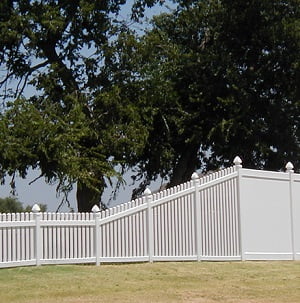Now that summer is here and storm season is winding down, many people will be turning their attention to grooming their yards and gardens for another summer of fun and outdoor activity. One important step in this process is maintaining your fence. While wood fences might need repainted or re-stained, not to mention replacement for any warped or damaged boards, a vinyl fence makes your summer maintenance program easy.
Cleaning Your Vinyl Fence
Vinyl fences are incredibly tough and keep their appearance for many years – but they still get dirty. Strong Texas winds and spring rains can kick up a lot of dirt and debris, at least some of which will end up on your fence. Fortunately, cleaning a vinyl fence is a relatively simple activity.
Clear the Area
Before cleaning your fence itself, it’s important to make sure the area around your fence won’t interfere with your maintenance. If you have trees or shrubs planted near your fence, this is a perfect time to trim them back to ensure they aren’t touching or growing against the fence. A rubbing branch can wear down your vinyl fence over time, and leaves and branches growing against the fence can cause damage or unsightly wear.
You’ll also want to clear away any leaves, fallen branches, or other material resting against the base of your fence. Wood and leaves rot, and they can leave ugly stains on your vinyl fence if they’re allowed to sit for too long. By clearing these materials away you ensure your fence will keep looking brand-new for years.
Spray it Down
After clearing away the debris from around your fence, it’s time to start cleaning. Most people will use a garden hose and a simple cleaning solution to wash dirt and other material from their fence. A hose will be able to remove most of the marks and debris that are on your vinyl fence, but in the event that some remain, you might have to use a cleaning solution.
There are a variety of cleaning solutions you can use on a vinyl fence. They include:
- Soap and water: The simplest way to clean a vinyl fence is often just with a little dish soap and water, along with a cleaning cloth or non-abrasive pad. You’d be surprised how much dirt and grime a little bit of soap can take off.
- Bleach and water: If your vinyl fence has more stubborn stains, such as mud, grass stains, or mildew, you may need a stronger cleaner. A diluted mixture of bleach and water is an effective cleaner for stubborn stains on vinyl fences. Mix approximately 4 to 5 parts water to one part bleach, and then apply it to the fence using a cloth or non-abrasive scrubbing pad. Make sure to wear rubber or vinyl gloves while working with this cleaner, too, as bleach will quickly harm your skin. Also, if your fence is colored (as opposed to white) you will want to test an inconspicuous area of the fence first, to make sure the bleach will not affect the color.
- Other cleaning solutions: Sometimes a vinyl fence gets stained by something that you can’t remove with simple household products. This can include tar, paint, wood stain, or driveway sealant. If you get any of these products on your vinyl fence, and you can’t get the stain out with household cleaners, give us a call and we’ll help you find a solution to get your fence back to top condition.
Power Washing a Vinyl Fence
Instead of using cleaning solutions, some people choose to use power washers or pressure washers to clean their fences and other outdoor equipment. In the right hands, a pressure washer can be a great way to save time and labor, but they also require considerable care. Improper use of a power washer can severely damage your fence.
To power wash a vinyl fence, you’ll want to choose a spray tip that has a wider, cone-shaped spray and a lower PSI, around 300 or so. If you use a higher pressure spray tip or too much water pressure, you run the risk of denting or cracking the vinyl. At that stage, the only option is to replace the damaged fence – not an ideal solution.
Remember also to not get too close to the fence as you’re washing. The ideal distance for using a pressure washer on a vinyl fence is about 3 feet between the nozzle and the fence. If you get too close, you could cause dangerously high pressures that could easily lead to damage. Keep a little distance and stay safe. If there are any areas that you can’t get to from further away, use a regular hose and some cleaning solution instead of risking damage to your fence.
How We Can Help!
Do you have more questions about care for your vinyl fence? Or perhaps you’d like to know how you can get one of these low-maintenance fences for yourself? Contact Future Outdoors located in Dallas, Texas to get the answers you need! We’re the number one provider of vinyl fences and structures in the Dallas-Fort Worth area, with years of experience helping customers get the right fence or shade structures for their homes. Our friendly representatives are waiting for your call!

